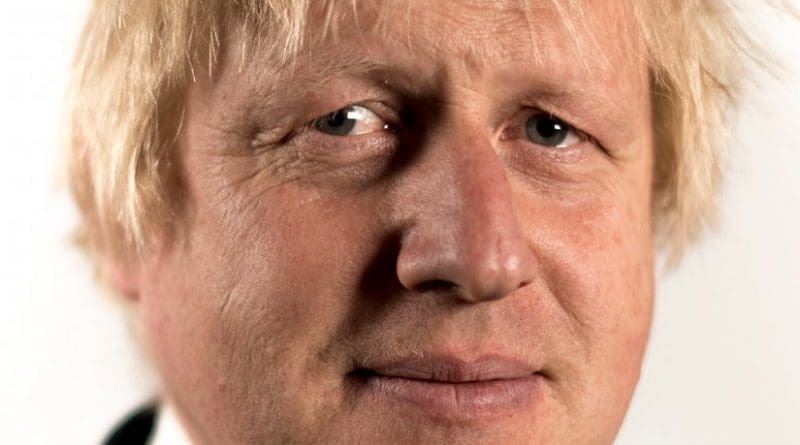Johnson’s Brexit Strategy Flies In Face Of Reality – OpEd
By Arab News
By Andrew Hammond*
Boris Johnson is facing a massive few days for his Brexit strategy as he prepares for next week’s Queen’s Speech and EU Summit. Since he became UK prime minister, he has repeatedly promised to “get Brexit done” by Oct. 31, but this rests on a grand political fallacy.
While the prime minister implies leaving the EU this month would put an end to the UK’s Brexit saga, this is far from the case. Moreover, his no-holds-barred, scorched-earth strategy risks further polarizing an already-divided nation.
Rather than concluding the more than three-year-long Brexit drama that has engulfed the nation, leaving the EU with or without a deal this month would only be the start of a new phase of negotiations that would help define UK and international politics well into the 2020s.
Take the example of a no-deal Brexit, which will not just mean that London will automatically leave the EU without many, it not all, of the rules that regulate the UK’s relationships with Brussels, but also many economic relationships with the rest of the world too, inasmuch as these are underpinned by trade treaties that the EU has agreed. Quite aside from the economic shock that such a hard, disorderly exit is predicted to entail, what some Brexiteers fail to acknowledge is the way that such a UK exit from the EU would dominate domestic politics for years. So much so that the rest of Johnson’s domestic policy agenda may be completely sidelined, especially given the increased political strains between England, Scotland, Northern Ireland and Wales.
If the reality of a no-deal Brexit dawns in November, both Brussels and London would almost certainly need to return to the negotiating table in the weeks that follow, but with a new set of incentives. As of Nov. 1, the UK would no longer be within the so-called Article 50 process. This would mean, officially speaking at least, that even a tweaked version of the withdrawal deal negotiated by Theresa May would no longer be on the table. And Britain would be a “third country” with the new European Commission leadership, which takes office in the autumn needing a new post-exit negotiating mandate from the EU-27.
A no-deal exit would therefore just be the end of round one of Brexit. The second round of discussions could take significantly longer under a no-deal scenario than if Johnson secured a compromise deal and got it through Parliament, as there would then at least be an agreed framework for moving toward a final, comprehensive deal during a transition period.
Without a transition, the negotiating process could get significantly harder, with the same trade-offs as before, including that of free movement of people versus scope of access to the single market, but with added time pressure if the UK economy is hurting more than that of the EU-27. One factor that may make concluding a final, comprehensive UK-EU deal significantly more difficult is that — outside of the Article 50 process that requires only a qualified majority of states to ratify — EU-27 unanimity would be needed, which risks one or two European states blocking any agreement.
Beyond this no-deal scenario, there is of course a different future that sees Johnson secure a political breakthrough over the Irish backstop, which might allow him to secure approval in Parliament for a modified version of May’s withdrawal deal. But even then Brexit would be far from over, as the next phase of negotiations would move mainly from the three core Article 50 issues — the financial settlement, citizens’ rights, and the Irish border — to the full spectrum of topics, from transport and fisheries to financial services and data transfer, which will collectively represent a new order of complexity to negotiate.
Take the example of converting the approximately 600-page withdrawal agreement, which would become a much longer legal text if ratified and transformed into a free trade deal, with many details the subject of long discussions — as the Canadians found in their seven-year discussions with Brussels to secure the Comprehensive Economic and Trade Agreement. Even the 26-page political declaration that outlines the future EU-UK relationship will require intense negotiations as it is translated into hundreds, if not thousands, of pages of legal documentation.
In what may prove the most complex discussions for London since the UK joined the EU in the 1970s, the current proposed transition phase of less than two years is not likely to be nearly long enough. This is why some European politicians, such as Irish Foreign Minister Simon Coveney, have proposed a five-year period. Yet neither London nor Brussels is prepared to talk openly about this, for now at least, which misleads the public.
Johnson’s desire to get Brexit finalized by Oct. 31 may make for a potentially eye-catching future election campaign slogan, but it flies in the face of reality. Far from the UK’s exit being done this autumn, with or without a deal, years of complex, detailed negotiations will inevitably follow.
- Andrew Hammond is an Associate at LSE IDEAS at the London School of Economics

